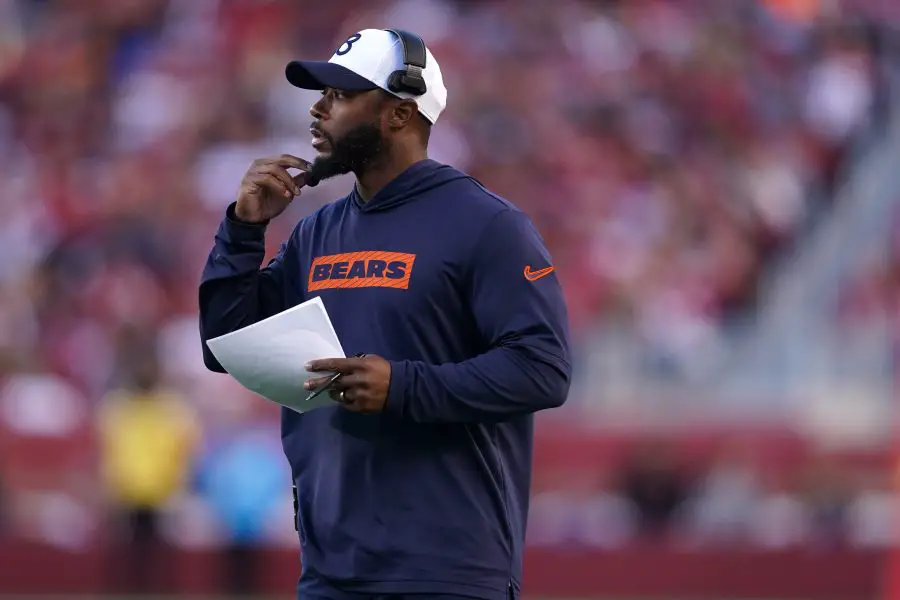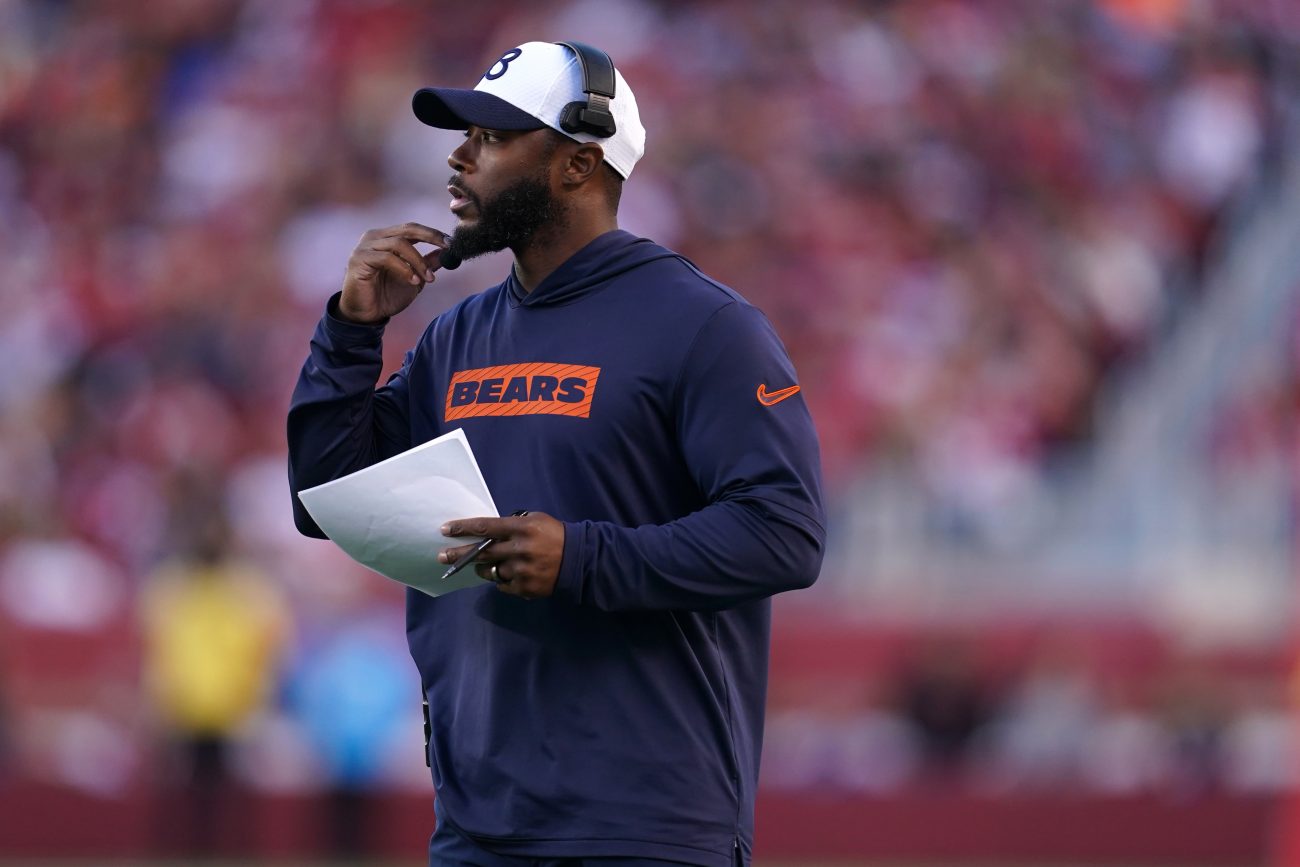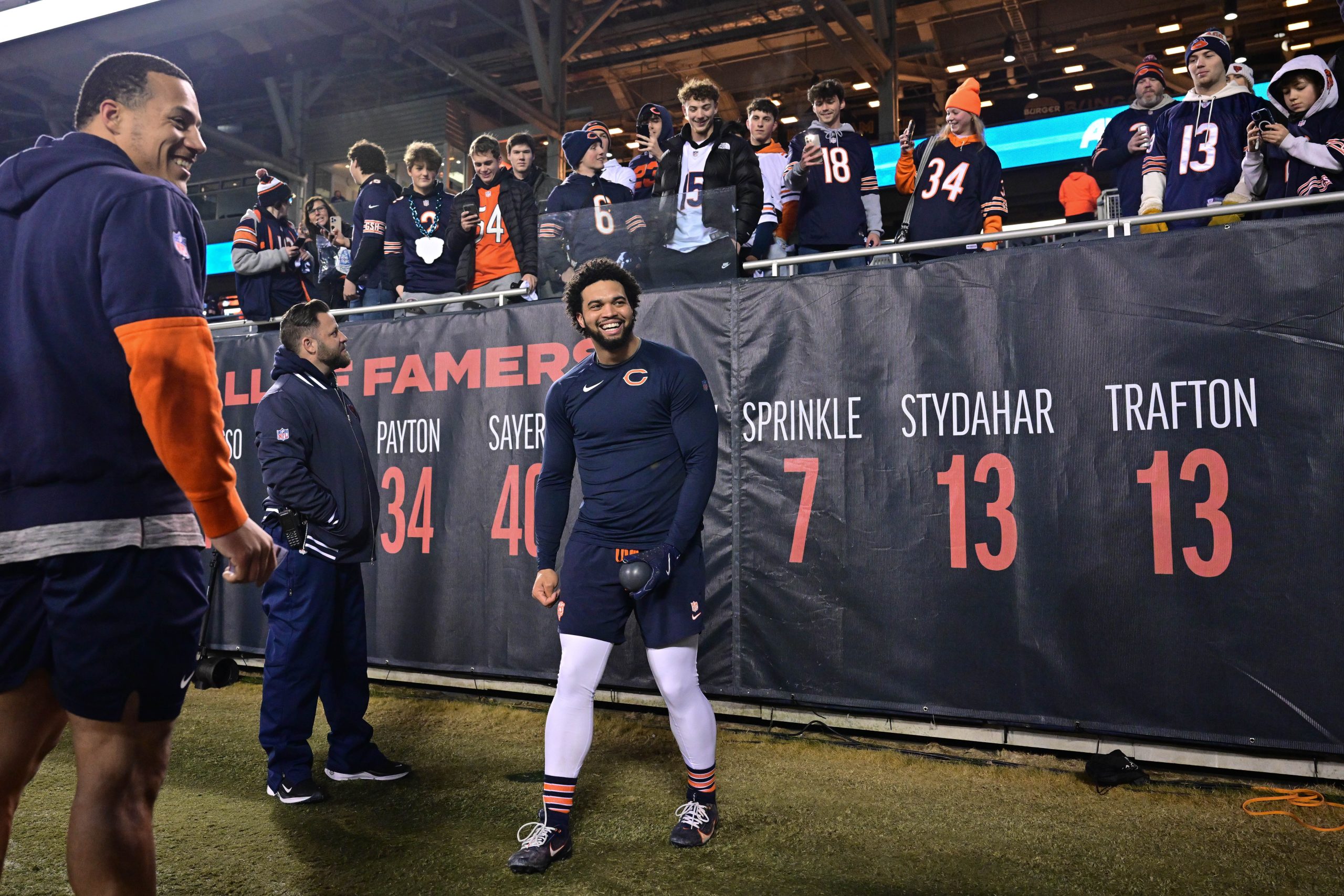Chicago Bears’ head coach Thomas Brown will likely oversee his final week of preparation for the team this week when his players get set to play the Green Bay Packers next Sunday in the 2024 season finale. Brown has served as the Bears’ offensive play-caller since November 17th and the team’s interim head coach since November 28th. Although the current play-caller was seen as an instant improvement over previous offensive coordinator Shane Waldron, he unfortunately over time has proven not to be any better than the coach he replaced.
Thomas Brown’s strong start as an offensive play-caller has fizzled out game by game
When Brown took over for Waldron following Chicago’s loss to the New England Patriots, the team’s offense was struggling significantly only scoring 27 points over a three-game span. The Bears’ offense was having prominent issues with pass-protection, pass play-design, and an inability to have sustained scoring drives. Waldron’s most glaring weakness during his time as offensive coordinator was his weakness to adjust his offensive scheme to the strengths of his players, including rookie quarterback Caleb Williams.
Through the nine games that Waldron was the Bears’ offensive coordinator, Williams was sacked 39 times, including three contests where he was sacked six or more times. Additionally, Chicago’s offensive unit only scored a first half touchdown in three of the nine games with the previous play-caller. When Brown took over for Waldron, protection for WIlliams improved as the rookie was only sacked three times in each of the new coordinator’s first two games, while the offense scored in a first half touchdown in each of those contests.
There was a lot of excitement through Brown’s first three games as offensive coordinator as the offense, especially the passing attack, showed more creativity and functionality as Williams averaged 276 passing yards and threw five touchdowns. One of the more noticeable improvements under Thomas Brown was the reincorporation of running back D’Andre Swift and tight end Cole Kmet into the passing offense. In the Waldron’s final three games as play-caller, Kmet and Swift combined for only ten receptions while the pair combined for 17 receptions in Brown’s first three contests as Bears’ play-caller.

It was because of the significant improvement on offense that led Brown to be promoted to interim head coach for the Bears following the firing of Matt Eberflus after an embarrassing clock-management gaff that led to the team’s sixth consecutive loss. Unfortunately since taking over as head coach, Brown has overseen an offense that has steadily gotten worst game-by-game in the month of December. Chicago’s offense has failed to score more than 17 points in their last four contests and have only scored a first half touchdown once in those games.
To make matters worse, Brown has failed to protect Williams in the month of December as the rookie has been sacked 18 times in the last four games. Despite injuries and lack of talent along Chicago’s offensive line, there appears to be coaching issues, as the lineman have often appeared confused with blocking assignment responsibilities, leading to free rushers or penalties. Additionally, there have been concerns about Williams regressing under Thomas Brown due to not being able to avoid sacks and not getting the ball out quick enough.
Thomas Brown has now made the same mistakes as Shane Waldron
Although Brown showed promise during his first three games as Chicago’s play-caller, his regression and struggles have mimicked the same issues that plagued Waldron before his eventual dismissal. There have been issues the last four games getting off to a fast start offensively, as the Bears’ offense has been shut out in the first half of three of those four contests. Additionally, Williams has failed to pass for 100 yards or more in those three games, as the offense has recorded multiple three and outs or turnover on downs.
Another sign of regression has been the decreasing use of Kmet, especially with the increased pass-protection issues on the offensive line. Chicago’s starting tight end has only registered three targets and three receptions over the team’s last four games, including two games with no targets at all. One of the reasons why Williams was able to get the ball out faster and avoid sacks when Brown took over play-calling was because of Kmet being featured, which didn’t allow opposing linebackers to blitz as much also.

The issues for Chicago’s passing offense hasn’t been as severe as the rushing attack, as the unit has averaged only averaged 86 rushing yards during their December games. Swift has struggled to have any significant impact on the ground as he has struggled to get off to a good start early and isn’t used later in the contest because the offense needs to pass more due to trailing. Thomas Brown hasn’t help either by calling wide receiver run plays the last few games that have gained little yardage or has led to turnover.
When Brown was promoted to offensive coordinator and then head coach a few weeks later, many believe that the play-caller would make the most of his in role to potentially earn the head coaching role for a long-term basis. Unfortunately, with how the Bears’ offense has performed, Thomas Brown has ended any discussion on being a potential candidate for the head coaching vacancy but now has also eliminated any possibility to be retained on the offensive coaching staff too. There will be many potential replacements lining up for the head coaching opening, but unfortunately, Chicago’s current offensive play-caller proved to be no better than the person he replaced.
For More Great Chicago Sports Content
Get the latest Chicago sports news, analysis, and breaking stories on the Bears, Bulls, Blackhawks, Cubs, White Sox, Sky, and more! Tap the star to add us to your favorites on Google News, so you never miss a story on your favorite Chicago teams.
Follow us on Twitter at @chicitysports23 for more great content. We appreciate you taking time to read our articles. To interact more with our community and keep up to date on the latest in Chicago sports news, JOIN OUR FREE FACEBOOK GROUP by CLICKING HERE




